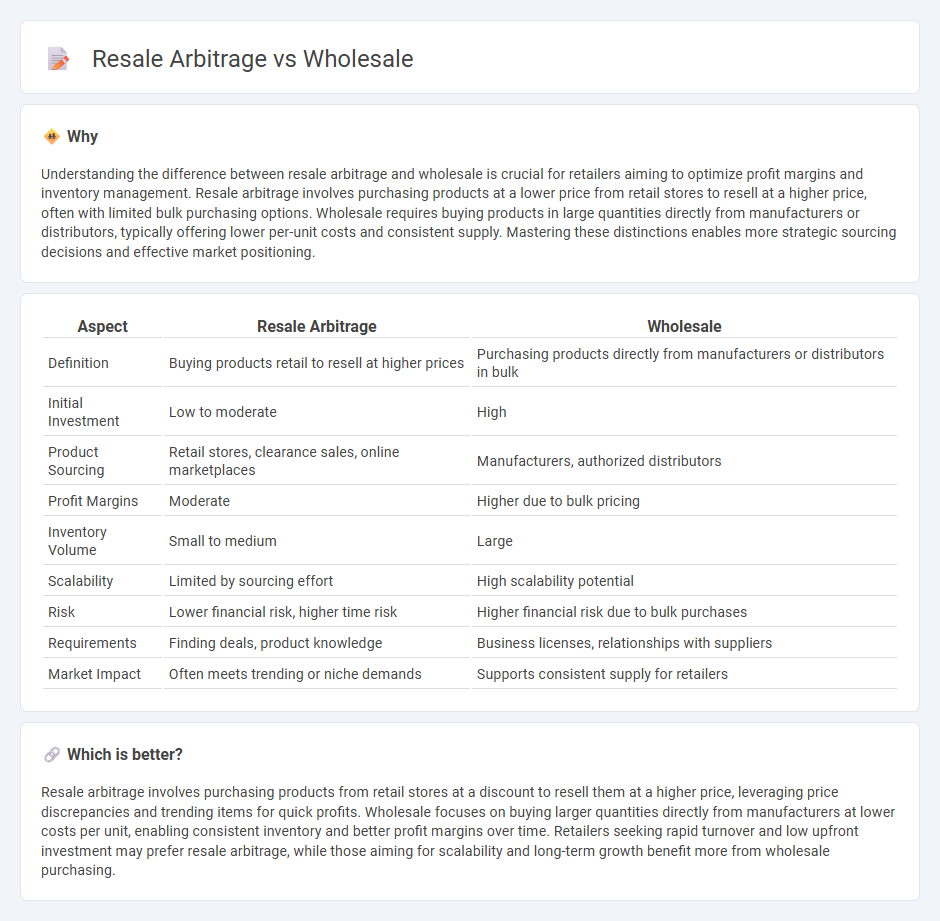
Resale arbitrage involves purchasing products at a lower price from retail stores or online platforms and reselling them for a profit, capitalizing on price discrepancies across markets. Wholesale, in contrast, entails buying goods in bulk directly from manufacturers or authorized distributors at discounted rates to sell at retail prices. Explore the advantages and strategic differences between resale arbitrage and wholesale to optimize your retail business model.
Why it is important
Understanding the difference between resale arbitrage and wholesale is crucial for retailers aiming to optimize profit margins and inventory management. Resale arbitrage involves purchasing products at a lower price from retail stores to resell at a higher price, often with limited bulk purchasing options. Wholesale requires buying products in large quantities directly from manufacturers or distributors, typically offering lower per-unit costs and consistent supply. Mastering these distinctions enables more strategic sourcing decisions and effective market positioning.
Comparison Table
| Aspect | Resale Arbitrage | Wholesale |
|---|---|---|
| Definition | Buying products retail to resell at higher prices | Purchasing products directly from manufacturers or distributors in bulk |
| Initial Investment | Low to moderate | High |
| Product Sourcing | Retail stores, clearance sales, online marketplaces | Manufacturers, authorized distributors |
| Profit Margins | Moderate | Higher due to bulk pricing |
| Inventory Volume | Small to medium | Large |
| Scalability | Limited by sourcing effort | High scalability potential |
| Risk | Lower financial risk, higher time risk | Higher financial risk due to bulk purchases |
| Requirements | Finding deals, product knowledge | Business licenses, relationships with suppliers |
| Market Impact | Often meets trending or niche demands | Supports consistent supply for retailers |
Which is better?
Resale arbitrage involves purchasing products from retail stores at a discount to resell them at a higher price, leveraging price discrepancies and trending items for quick profits. Wholesale focuses on buying larger quantities directly from manufacturers at lower costs per unit, enabling consistent inventory and better profit margins over time. Retailers seeking rapid turnover and low upfront investment may prefer resale arbitrage, while those aiming for scalability and long-term growth benefit more from wholesale purchasing.
Connection
Resale arbitrage and wholesale are interconnected strategies within retail that both focus on acquiring products at lower costs for profitable resale. Wholesale involves purchasing goods in bulk directly from manufacturers or distributors at discounted prices, while resale arbitrage capitalizes on buying discounted or clearance items from retail stores to sell at higher prices. Combining these methods allows retailers to diversify inventory sourcing, optimize profit margins, and adapt swiftly to market demand fluctuations.
Key Terms
Bulk Purchasing
Wholesale arbitrage involves buying products in large quantities directly from manufacturers or distributors at significantly reduced prices, maximizing profit margins through bulk purchasing. Resale arbitrage typically includes acquiring products from retail stores at discounted prices, often in smaller quantities, and reselling them for a profit without the scale benefits of bulk buying. Explore the advantages and strategies of bulk purchasing in wholesale arbitrage to enhance your business profitability and efficiency.
Price Discrepancy
Wholesale arbitrage involves purchasing products in bulk at significantly lower prices directly from manufacturers or authorized distributors, enabling substantial price discrepancies and higher profit margins. Resale arbitrage focuses on buying individual items at discounted retail prices and reselling them for a markup, often capitalizing on temporary promotions or clearance sales. Explore the nuances of price discrepancy strategies in wholesale and resale arbitrage to maximize profitability and market efficiency.
Inventory Sourcing
Wholesale arbitrage involves purchasing bulk inventory directly from manufacturers or authorized distributors at discounted prices, ensuring consistent product availability and lower per-unit costs. Resale arbitrage relies on sourcing items from retail stores or online marketplaces at a lower price, then reselling them individually for profit, often with more variable inventory and margins. Explore strategies to optimize inventory sourcing for both wholesale and resale arbitrage to boost profitability.
Source and External Links
Wholesaling - Wikipedia - Wholesaling is the sale of goods in bulk to retailers, industrial, commercial, or professional users, typically at discounted rates before they reach end consumers, involving activities like assembling, sorting, and redistributing goods in smaller lots.
How To Find Wholesale Suppliers (2025) - Shopify - This guide explains wholesale buying, sourcing options, and platforms such as Shopify Collective and Alibaba to connect retailers with wholesale suppliers offering bulk products, often with flexible payment and shipping options.
Wholesale Central | Leading Source for Wholesale Products ... - Wholesale Central is a large directory of wholesalers offering a wide range of products across categories like apparel, electronics, health, home decor, and many others for bulk purchasing.
 dowidth.com
dowidth.com